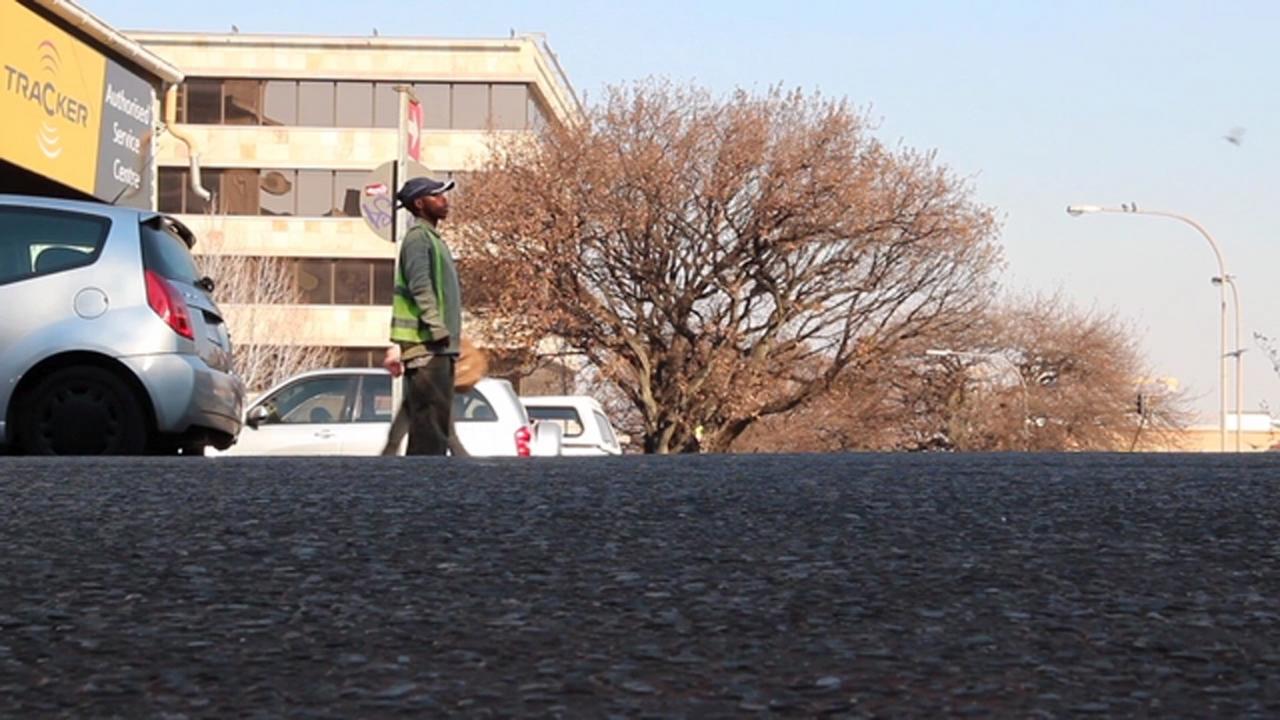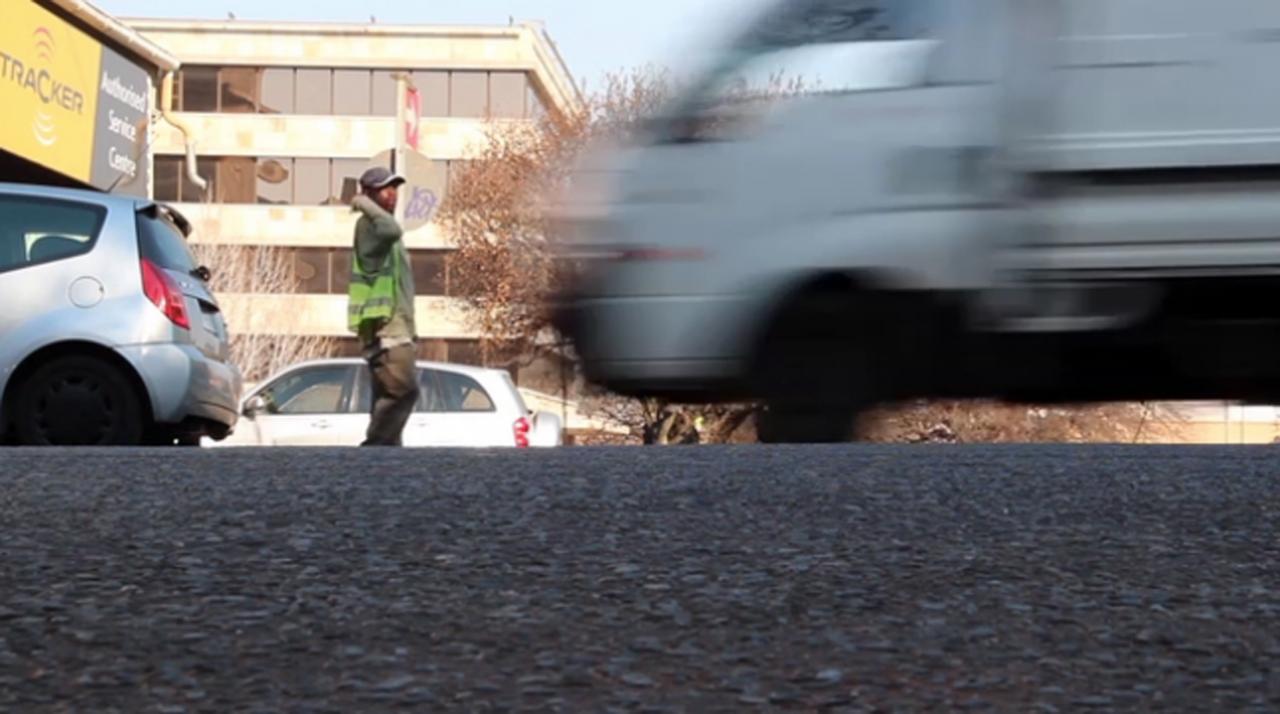Godfrey Garage


Godfrey Garage (folded spirits)
By Bronwyn Law-Viljoen
Subjective experience is drastic,
indifferent, careless and persevering
Where is its centre?
—Jürgen Partenheimer
Godfrey stands on Jorrissen Street in Johannesburg, directing traffic. This is October and the rains—quick, hard, sending torrents down storm-water drains along with dog-bitten tennis balls, dead winter leaves, shit, plastic bags, spilled fast food, down into the tunnels that eventually expel everything into the city dams—have turned the London plane trees along the margins of the asphalt from leather sentinels to green whisperers. I pass Godfrey in my search for parking, circling three blocks several times, hoping that someone parked under the trees will vacate their spot. We always seek the shade.
Each time I drive by, Godfrey gestures left or right, pointing out a space on the sidewalk, or a car-sized gap but with a yellow line running through it, or an opening too close to the underground parking exit for others to get by comfortably. I keep circling. He keeps gesturing, mildly watching me, and others who are also hunting. He directs the onrush of taxis and cars though they pay him no mind.
Eventually I stop, and he hastens across the street to usher me into a tight spot. He positions himself and waves calmly, drawing me back, back. And then a hand held up stiffly to indicate that I should brake. I turn off the ignition and sit for a while listening to the end of a news report, the window down. Godfrey stays in his spot at my bumper, waiting, and I watch him in the side mirror. He barely tops the roof of the car, even with his hat on. His winter scarf is gone.
He anticipates my exit from the car and is at the door, giving me and my bags space. He greets me, ‘Welcome to Godfrey Garage, my sister from another mother.’ And begins: ‘Under the tree, onder die boom. You know, people ask me and I tell them, no water—no life. No water—no life. You need the water to drink, water for washing, water for cooking, water for the trees. No water no life. What time you leaving?’
‘Around five today.’
‘You know, Godfrey leaves at exactly four o’clock. If you give me four rand, I’m gonna get me something to eat and God is gonna bless you.’
I check my purse and give him four rand.
‘Thank you, God is gonna bless you. You know, everything has a time,’ he says as I shoulder my bags. ‘June is for the freezing, October is for rain, December is for the summer. You gotta have respect.’
He turns to see who is coming down the street, noticing the slowing of a car on the prowl. I thank him and walk away. He crosses back to his position on the other side, near the shop selling chips and cigarettes, just beyond Henri Street.
We do this everyday. His beat is the three blocks outside the neocolonial concrete edifice of Senate House. Five days a week. Eight in the morning until exactly four o’clock, twelve months a year. I don’t come by in December much so I don’t know if he takes leave like the rest of us. I imagine he does. In January he is there, welcoming customers to Godfrey Garage, the space he has marked out for himself, and into which no other car guards intrude. The university security men in their khaki and burgundy uniforms patrol up and down with their walkie-talkies but don’t bother him.
He understands timing—of the traffic, of when you are going to exit the car, and when he should greet you. He understands traffic—God knows he watches its ebb and flow enough—and drivers. He thinks them foolish for ignoring his directions to mount the pavement and squeeze into an illegal spot, but is only mildly judgmental—a raised eyebrow, a slight skeptical tilt of the head. He understands what makes for good business: reliability, never being closed, an equal measure of politeness and familiarity.
I once saw him arguing with the owner of the shop who had placed two orange cones on the street to prevent anyone blocking his storefront, no doubt expecting a delivery. The shopkeeper moved the cones into position and Godfrey shifted them a little to make space for a car. The shopkeeper moved them again, speaking loudly and gesticulating. Godfrey waited for him to go back inside, and then moved the cones out of the way.
His rates have been the same for the two years that I have parked here—four rand, no matter what time of day you arrive and leave—and his verbal repertoire is almost unvarying. On a different day he might begin with the part about having respect and then expound, briefly, on the necessity of water for life. But sometimes there is a new line inserted into the script, some thought about the world that might have struck him as he waved cars by or watched an inexperienced driver stop-start out of a bay. It’s often about the unvarying nature of the world, some pattern that is endlessly repeated—rain, the weather in general, human habits. Today he stood for a moment longer than usual under the tree, and then remarked that indeed it was not so hot here in the shade. I understood this to be the kind of line one might speak to oneself to make what’s unpleasant about the job—for him, the heat rising from the tar on a sweltering day—seem not so bad. A small comfort to bolster oneself.
The beginnings and the endings of Godfrey’s days at his place of work, where I encounter him, fall off the edges of our interactions. I guess at them sometimes as I walk towards Senate House. At four, he stops gesturing at taxis and hails one, perhaps, or walks a few blocks to catch a bus going in his direction. Beyond that I cannot imagine. His life is sealed from me, as mine is from him. We speak for perhaps one minute on most weekdays, and then we move on. When I come back to my car at five, he is gone.
This is not a documentation of someone I encounter under the plane trees on Jorrissen Street, an attempt to understand the life and times of another person. This is merely a brief meditation on water, on patterns, on repetition. The cycle that dominates the flowering and shedding of the trees draws me and Godfrey into its shadows and openings. We come and go under the trees, stepping on their leaves in the winter, in the summer pausing for a second in their green shade before moving out into the sun.
On rainy days, Godfrey is slightly damp, his reggae scarf wound tightly around his neck. I shoulder my bags quickly and step over the deep puddles next to the car. No water, no life. Some days I park in the sun, and when I return to my car it is baking quietly, the steering wheel too hot to touch. If it’s still business hours, Godfrey might be resting against the pole on the corner of Henri and Jorrissen. We don’t speak at the end of the day, though we may wave to each other as I drive off. Transactions—conversations—are conducted strictly upon my arrival. In winter, he sticks to the sunniest spots, warming himself like a lizard against the wall of the shop as he takes his tea. My bags slide off the bunched-up shoulders of my several layers of clothing, and finding money to pay for my parking takes a few seconds longer in the cold.
I enter and leave the car to the sound of the radio. Sound and information, the weather, how we are doing things now. Sometimes I stay longer if the news is compelling enough. On occasion, I cry at something, some cruelty of one human to another, some tale of an animal neglected or abused. I stay in the car as much to hear the story as to compose myself before the encounter on the street.
I could make of Godfrey an elemental constant, make him essential in the way that the trees or the wind are, some symbol of a thread of life impervious to news told on radios. But he is not. He is only a man at work. He is a man at work.
He does, however, value the fundamentals. Water, respect, patterns. He stops under the plane trees and seems to listen, to think for a moment before he speaks. The trees shussh quietly, dropping papery seeds onto the pavement. Traffic passes, a plastic bag flutters across the road in a crosscurrent of air. We are folded into a shadow.